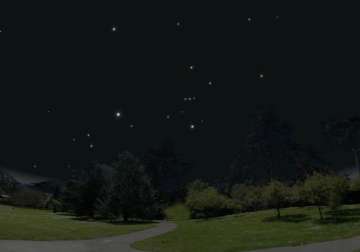New Delhi, Mar 27: Sixty minutes of Earth Hour gave Delhiites an opportunity to get a real gaze of the night sky dotted with thousands of stars, which they normally cannot view due to light interference.
Hundreds of sky gazers and amateur astronomers gathered at parks lining the India Gate last night during the Earth Hour. They could see the actual night sky with stars that are generally not visible to naked eyes due to excessive lights.
“Nature has given us inspiring night skies filled with thousands of beautiful stars. From cities, we just get to see a few of them as they are covered by the layers of light pollution,” Rathnasree, Director-Nehru Planetarium, said. “If in a particular small segment of the sky, nature has made dozens of stars, the light polluted city skies might show just three or four stars.” the Nehru Planetarium director who was at the India Gate to take a glimpse at the stars. People got a rare chance to see some faint stars in the night theatre as the light pollution dipped marginally, an amateur astronomer said.
“Guess! last evening we could get a glimpse of planet Saturn , which on any other given day would be a prized sight in Delhi sky. I saw Saturn, which was 18 degrees above the eastern horizon,” said R C Kapoor, a retired professor from Indian Institute of Astronomy.
Several constellations, such as Ursa Major, Perseus, Taurus, Gemini, Leo, Orion and Canis Major, were easier to locate, sky gazers said.
“Find Betelgeuse in Orion, the supernova in waiting— shortly from now, or even a thousand or a million years later, when - who knows!,” an elated amateur said. “Before the Earth Hour, the shape of Leo constellation was not visible to the naked eyes, but during the Earth Hour, one could see around 10 stars of the constellation,” Ajay Talwar, a member of Amateur Astronomers Association, noted. The sickle and the triangle—two shapes seen in the constellation—were easily visible, he said. The Association had put four telescopes at the site to enable people catch a glimpse of the stars.
A special ‘Globe at Night' was organised by the Space Popularisation Association of Communicators and Educators (SPACE), an NGO, on the eve.
“The idea was to make urban population aware of the fact that they do not get much exposure to the wonders on the night sky,” C B Devgun, Director SPACE, told PTI. This exercise also helped in quantification of light pollution. “This project will help us in reclaiming our dark skies and see once again the celestial wonders that are no longer visible in the night skies from the cities,” he said.
Organised by the World Wide Fund for Nature, the ‘Earth Hour' is observed by turning off non-essential lights and electrical appliances for an hour -- 8:30 pm to 9:30 pm on March 26 every year. PTI
Latest India News

